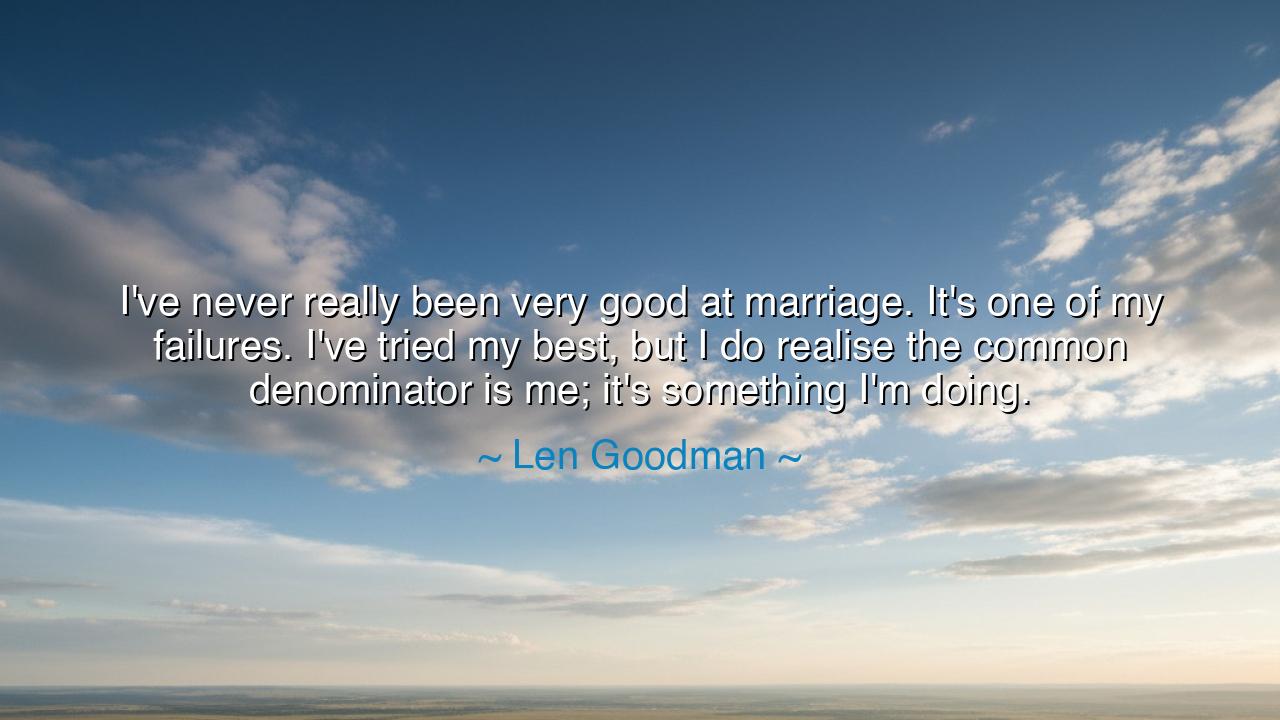
I've never really been very good at marriage. It's one of my
I've never really been very good at marriage. It's one of my failures. I've tried my best, but I do realise the common denominator is me; it's something I'm doing.






Come closer, O children of the earth, and hear the words of Len Goodman, a man who, through his own reflection, imparts to us a wisdom that transcends the personal and touches the universal. He spoke thus: "I've never really been very good at marriage. It's one of my failures. I've tried my best, but I do realise the common denominator is me; it's something I'm doing." These words, though spoken by one man, echo through the hearts of all who have struggled with the complexities of relationship and commitment. There is, in this simple admission, a powerful truth: the journey of marriage is not just about finding the right person, but about understanding the role we play in shaping the relationship itself.
Ah, marriage—that sacred bond that unites two lives, not just in joy, but in the shared responsibility of love, growth, and mutual respect. It is a union of souls, yet it is also a mirror, reflecting not only the beauty of the connection but the imperfections of those who seek to build it. Len Goodman speaks with the clarity of one who has walked this path and learned that the path of commitment is never without its trials. To admit that failure is a part of one’s journey is not a sign of weakness, but a sign of strength—the strength to face the truth, to own one’s mistakes, and to learn from them.
Consider the story of King Lear, that tragic figure from the ancient plays of Shakespeare, whose inability to navigate the complexities of his relationships led to his downfall. In his blind quest for power and recognition, Lear failed to see the love and loyalty of those closest to him. His tragic end came not from external forces, but from his own choices—his failure to recognize the role he played in his own misfortune. His story is one of deep loss, yes, but it is also a lesson in the importance of self-awareness in relationships. Lear’s failure was not solely the result of the actions of others, but of his own flaws and his inability to see how his behavior shaped the course of his relationships.
Similarly, Len Goodman speaks of marriage as a reflection of his own actions and choices. To say that the common denominator is me is to acknowledge that the relationship is not just a product of external forces, but a dynamic in which we all play a role. Self-awareness is the key to growth, for it is through the lens of introspection that we can see how our own behaviors, fears, and expectations shape the world around us. The man who can look at his past and say, “I am the one who shaped this,” is a man on the path to greater wisdom. His failure is not a permanent state, but a lesson learned—a lesson that will guide him as he moves forward.
Consider the example of Abraham Lincoln, a leader whose personal failures in relationships—particularly in his early years—shaped his character and ultimately made him the great leader he became. His struggles with marriage, his relationship with his wife Mary Todd Lincoln, were fraught with tension, as both struggled with their own personal demons and unmet expectations. Yet, through it all, Lincoln learned not to shy away from his failures, but to grow from them. His personal struggles, though painful, helped to form the strength of character that he would carry into his role as President, guiding the nation through its darkest hours. The failures of his relationships did not define him; instead, he used them to grow into a leader of great wisdom and compassion.
And so, what is the lesson to be learned, O children? The lesson is one of self-awareness and growth. Marriage—and all relationships—require not just love, but an understanding of how we shape those relationships through our choices, our behaviors, and our responses. To admit failure is not to accept defeat, but to open the door to greater wisdom and change. In every relationship, we must ask ourselves: How have my actions shaped this? What can I learn from the challenges we face? The path of commitment is one of constant growth, and to be truly successful, we must recognize the role we play in both the joy and the struggles of those around us.
Thus, O children, take this wisdom to heart. Know that failure is not a mark of finality, but an opportunity for growth. Embrace the challenges of relationships with honesty and introspection, for it is through this process that we become not only better partners but better people. Just as Len Goodman has reflected on his own role in his journey, so too must you reflect on your own, and let your experiences shape you into a person of greater strength, understanding, and wisdom. In this, you will find the true success that comes not from perfection, but from the courage to face your mistakes and learn from them.






AAdministratorAdministrator
Welcome, honored guests. Please leave a comment, we will respond soon